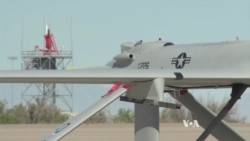In 2006, stirred by photos of U.S. soldiers mistreating Iraqi prisoners, a group of American faith leaders and academics launched the National Religious Campaign Against Torture. It played an important role in getting Congress to investigate, and the president to ban, torture.
Last weekend, many of the same individuals met again on the idyllic campus of the Princeton Theological Seminary, and called for an immediate halt to targeted killings by drones.
Drones -- or unmanned aircraft -- are a highly secretive, yet crucial, part of U.S. counterterrorism strategy. They are typically flown in places like Afghanistan, Pakistan and Yemen, and steered from the ground by pilots at U.S. air bases.
But theologians at the Interfaith Conference on Drone Warfare said they are morally troubling.
“It is a video game!” said Rev. George Hunsinger, a Princeton theologian and the driving force behind the anti-torture campaign.
“You see these soldiers, these pilots, joking in the cockpit, and you see what is on the screen, the crosshairs and so on - they are blowing people up as they cross the street, in a sidewalk. On what grounds?”
Proponents say drone warfare keeps U.S. troops out of harm's way, while minimizing civilian casualties. Human rights groups say civilian casualties are hard to count because of the secrecy of a program partly run by the CIA.
Around 500 strikes have been counted since the program began in the aftermath of the September 11, 2001 attacks in the U.S., but activists note that most were carried out under President Barack Obama’s administration since 2009.
Earlier this week, Obama indicated they will continue in Yemen, despite the leadership crisis there.
“Because the alternative,” the president said, “would be massive U.S. deployments in perpetuity, which would create its own blowback and cause probably more problems than it would potentially solve.”
Rev. Susan Thistlethwaite, former president of the Chicago Theological Seminary, called Obama’s reasoning “bogus.”
“Drones allow you to use violence in situations where you would never send in boots on the ground,” she said. “So that it actually expands the theater of war. And you could make a case now that drones make the whole world a battlefield.”
Catholic University international relations professor Maryann Cusimano-Love warned that American technological superiority on drones would only go so far. She said drug traffickers have delivered packages with drones, while several have been discovered flying over a French nuclear plant.
“How is the world going to look as others come on to use these technologies, in the same way that we have?” she said. “I think that has been a real blind spot.”
Only two days after her warning, the threat came into focus when a toy drone flown onto the White House lawn triggered a major security alert.
A poll last year found that 56 percent of Americans support drone strikes, while another 18 percent are not sure. But Sudanese-born Imam Mohamed Magid said drone strikes are a recruitment tool for extremists.
“Every time we take one person, and then we take the life of innocent people, we create more terrorists,” he said.
Some participants argued that drone strikes could be justifiable in extreme cases. But Reverend Bob Moore of the Coalition for Peace Action said such cases don’t exist.
“If drones existed at the time of Adolf Hitler, I personally would probably have been in favor of using one to try to stop the Nazis,” he said. “But in the real world today, we don’t have that kind of situation.”
Bishop Richard Pates of Des Moines, Iowa said the Catholic Church is worried that the U.S. is responding militarily too often to crises.
“What’s the old saying? If the only tool you have is a hammer, then every problem seems to be a nail," he said.












